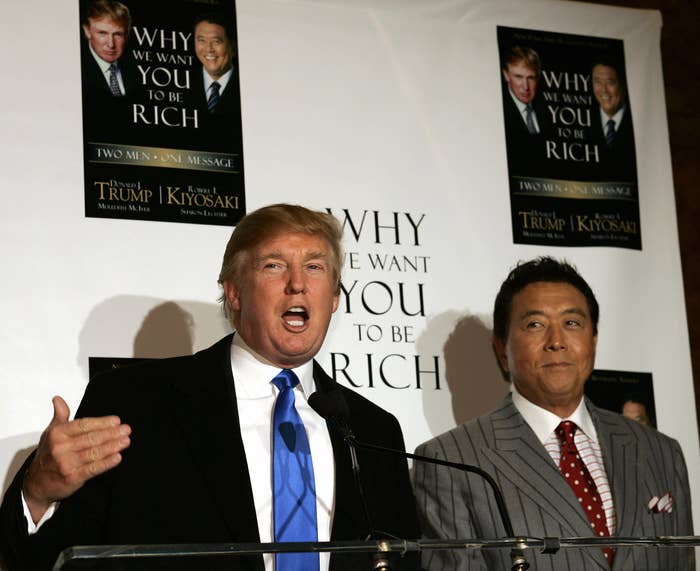
When Donald Trump announced his tax plan last year, one expert analysis said it would result in major savings for the wealthiest Americans and reduce federal revenue by 22% over 10 years.
The type of plan of Trump is now advocating, however, was criticized in a book he co-authored in 2006 with his friend and fellow self-help guru Robert Kiyosaki. The book, Why We Want You To Be Rich: Two Men • One Message, features Trump and Kiyosaki offering their opinions to the reader.
In one section, authored by Kiyosaki and followed by paragraphs from Trump noting he agreed with the opinion, both tax cuts for the rich and supply-side economics are cited as examples of how the government's tax system favors the rich.
Writes Kiyosaki:
Tax breaks for the rich: Most of us know about the Golden Rule that reminds us about doing unto others. The Golden Rule I am talking about is the one that goes, "The person who has the gold makes the rules." It is a tragedy that in America the poor and middle class have lost their representation in government. Today, the rich make the rules, which is why the rich are getting richer. On May 11, 2006, ABC News ran the story about the latest tax cuts. Quoting from the story: "The tax policy center, a Washington think tank, discovered that the top 0.1 percent of tax payers— the people who make more than 1.8 million— would get back $ 82,000. Middle-income Americans making between $ 27,000 and $ 47,000 would get $ 20."
And in the next paragraph:
One monetary theory encourages tax laws that favor the rich— the idea being, if the rich had more money, they would invest it, thus creating more jobs. Money would trickle down to the poor and middle class. This theory is sometimes called "voodoo economics" or the "trickle-down effect." While it sounds good in theory, and while some money does trickle down, the net result is the money stays in the hands of the rich. In many cases, asset prices increase because the rich have more money. Why do asset prices increase? Asset prices increase because that is what the rich buy with their money— assets, which is one of the reasons why they are rich. When asset prices increase, it makes assets (things of real and lasting value) more expensive, out of the reach of the poor and the middle class. Just look at the price of real estate and ask anyone who has not yet bought a house if they think it is easy to afford the house of their dreams today. It's tough to buy a house with money that is only trickling down.
Trump chimes in next to note any one of the problems Kiyosaki cites could cause financial ruin for the country. Many of the issues Trump mentions are ones he has long discussed, like the U.S. trade deficit and a weak dollar.
Writes Trump:
You prepare yourself, you equip yourself for what might happen. I don't want to be a financial fearmonger, but I have to tell you that things aren't looking so great. Our financial security is shaky. Just because you can shop at Saks today or online tonight doesn't mean that everything is just fine and that there's nothing to worry about. Don't fall for that comfort-zone happy state.
Don't be shortsighted. Robert has spotlighted some very real problems that face us all today: 1) A growing trade deficit 2) A growing national debt 3) A falling dollar 4) Baby boomers without money 5) Entitlement mentality 6) Higher oil prices 7) Tax breaks for the rich. Any one of these problems could spell financial ruin for any country. It is more important than ever that you educate yourself and your family so that you can protect yourself financially in the future. Through education, you gain vision. Through vision, you gain the ability to spot economic problems and turn them into economic opportunities. However, you must be careful about what kind of education you receive.
